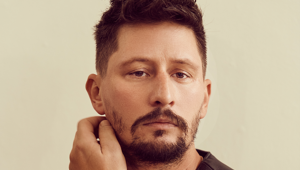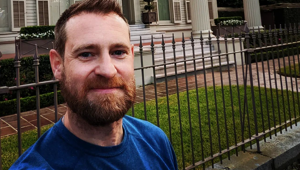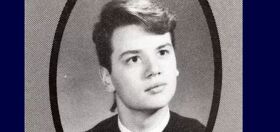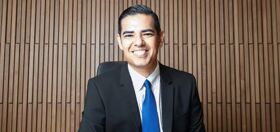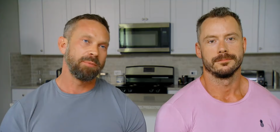
“None of us are together, though we do see each other every day in these little chat rooms.”
Writer Amos Mac utters the words with a near giddiness at the sight of his friend and collaborator, Chase Joynt. The pair have good reason: their first project together, the feature documentary No Ordinary Man, landed a spot at the prestigious Toronto Film Festival. Of course, none of us could be at the festival together thanks to COVID-19. Online streaming of the festival titles is the best we could do under the circumstances.
For Mac, best known as a script coordinator on the TV series Transparent and producer for the show Gaycation, the film marks his first outing as a screenwriter. For Joynt, the film serves as his debut outing into feature directing. For the pair together, No Ordinary Man represents a shared passion, and an untold chapter of queer history. The movie chronicles the life of Billy Tipton, a successful jazz musician, recording artist and family man whose 1989 death ignited a tabloid scandal. Medical examiners leaked to the press that Tipton–a husband and father–was actually transgender.
Now Mac & Joynt, along with co-writer and co-director Aisling Chin-Yee, aim to reconstruct Tipton’s life with a bit more respect. Utilizing interviews with family, including Tipton’s son, Billy Jr. as well as other musical and transgender luminaries, the film recounts Tipton’s life, personality, and his place as a trans icon.
How about we take this to the next level?
Our newsletter is like a refreshing cocktail (or mocktail) of LGBTQ+ entertainment and pop culture, served up with a side of eye-candy.
Queerty sat down with Joynt & Mac to talk about Billy Tipton, their unusual approach to the film, and the public’s ongoing fascination with transgender people. No Ordinary Man is currently seeking distribution.
How did you first discover the story of Billy Tipton?
Amos Mac: Billy has always been in the aether of my experience as a trans man. He’s always been talked about. He appears in listicles, in MySpace posts of early trans icons. Aisling reached out to me. She was looking for a transmasculine screenwriter. I live in Los Angeles. We have friends in common, so that’s how the conversation began. I was really excited to dive in and learn more about Billy.
How did you get involved, Chase?
Chase Joynt: Very soon thereafter I knew the project was brewing. Ashely & Sarah Spring, our producer at Parabola Films, who is responsible for the project, are deeply embedded in a group of Canadian documentary filmmakers and friends. So it was an easy connection. Just as Billy has existed in the aether, Amos & I have hovered around the same transmasculine spaces for over a decade. Knowing he was attached was a huge boost for me. As a doc filmmaker, as a trans person, as someone interested in trans history, I’ve always been really compelled by who gets to control the narrative.

Sure.
CJ: His story has so long been controlled by talk shows and tabloid media that this project was an incredible chance to really see what would happen when we put Billy Tipton’s story in the hands of trans creators.
That’s wonderful. You adopt an interesting tactic in the film, bringing in trans men to “audition” for the role of Billy in a biopic. How did that idea come about?
AM: It was an early part of a conversation, and a way for us to incorporate Billy’s story and different aspects of his story without doing reenactments. Also, there’s no footage of Billy Tipton that we could find, even though family and deep research. So this was a wonderful way to go about it without using the typical reenactment format.
It’s a really interesting device. One of the most moving parts of the film is seeing these would-be actors connect with Billy, and how inspired they are. It’s powerful. You mention the family. How did you find William Jr.?
AM: I know Billy Tipton, Jr. had been in touch with Parabola [the film’s production company]. I was thrilled when we did get him, but Chase can speak more to that.
CJ: I think Billy Jr. is really interested in preserving and protecting his father’s legacy. I think he was always willing to be in conversation with the team at Parabola. But he came with a series of questions. When we encountered him, he was trying to figure out who we were just as much as we were trying to figure out who he was. So it was a real collaboration at his house in Spokane over those days as we collectively chose to continue walking toward each other in pursuit of this story.
What kind of concerns did he have? Obviously, he’d already been through the wringer in terms of talk shows and tabloid coverage.
CJ: I wonder if we have different answers for that, Amos. No one has asked us that question. I want to be careful; I don’t know what his concerns were, but I can tell you what I experienced as the person who interviewed him.
Please.
CJ: It’s very clear that Billy Jr. has internalized the narrative about trans people that the media has produced about trans people in public: that transness is linked to pathology and sickness and deception. While he protects his father from that, he understands that the cultural construction around transness at that time was a violent one. So I think Billy Jr., very rightly, has hesitation when people approach him to ask the same questions. He feels as if there might be more accusations, or that the structure of an interview might cast him in a negative light. I think through our ongoing interactions he came to understand our creative team was approaching his dad’s legacy from a very different position. We’ve all absorbed the media narrative, but there are ways to ask questions differently. We could pursue his story in a far more empathetic way.
Related: Genderbent rock icon Hedwig isn’t trans, says creator John Cameron Mitchell
Sure. Amos, is that your impression of Billy Jr.?
AM: I can’t really speak for Billy, Jr. My impression was exactly what Chance said: he knew what trans people were from his experience in the 90s being on those talk shows. That was his bubble. Our bubble, as trans people creating culture, is very different. Being publicly out, just Chase & I specifically—I don’t even think he knew that experience existed for trans people. That was my perception. He seemed to be blown away that his father was still thought of by people of trans experience. You can see his mind wrapping around the idea that was he was told is not the only trans narrative.
Do you feel like he changed his view on his dad going through this process?
CJ: I think one of the most incredibly beautiful things that we learned about Billy Jr. is that he’s never really had to change his opinion about who his dad was. He’s always loved his dad. He’s always supported his dad. He’s always been loyal. I think he’s felt really defensive about the rest of the world projecting back on him, his family, and his dad’s legacy. So instead of Billy saying “Oh my God, I see my dad in a new way,” I think he realized there’s another reading that goes alongside his that doesn’t sit against it. To imagine Billy Tipton as a transmasculine subject in history is to say “Yes, and” to what he already understands.

One moment in the film stands out, where he realizes his dad is this transgender icon, which appears to be a thought that hadn’t occurred to him. Off-camera, how did he respond to it all?
CJ: That’s me on the other side of that camera. Amos was very close to me; we were within a foot of each other.
AM: I wish I could have held your hand during that moment.
Aww.
CJ: Amos, I love that. I feel like we’re having these moments in these interviews where we disclose to one another the underbelly feelings that we have.
AM: It was a very intense moment.
CJ: It was intense. The way I’ve come to understand it is to say it was an exchange of generosity. I really feel like Billy Jr. came toward us in a very vulnerable and open state. As a maker of this project, and the asker of those questions, I felt I had to walk toward him with the same intention.
One subject that seems recurrent throughout the film—or at least it surrounds Billy’s story—is the idea that he was married five times to women. Kitty, his wife, claimed she had no idea that Billy was trans. Do you think that’s a totally sincere answer, or that she was willfully ignorant?
CJ: I think people deserve the privacy of their pasts. I don’t want to misquote anyone in our film. I believe it’s Thomas Page McBee. He says people underestimate their wives. People underestimate the strategy that’s in play for all being subjected to this kind of talk show violence. Whether or not Kitty knew, I don’t really care. It’s irrelevant to me. What’s more interesting to me is the way she positions herself in solidarity with Billy, even after his death, in the face of that kind of violent curiosity. I love that Billy Jr. holds true as well to protecting their own understanding. I think there’s a brilliant opacity in that.
Awesome answer. You also use the audition process as a kind of prism with which to see transmasculinity in a way that we haven’t before. It’s amazing to see these men connect with this figure most of them didn’t even know about. We’re suddenly, in the past year or so, starting to see more transmasculine stories. Why have we not seen more prior to now?
AM: I think that in Hollywood there are voices banding together. There are people working behind the scenes—myself included, as a writer. There are actors, producers, directors, script coordinators—all these different pieces that come together who are of a trans experience wanting to create more stories.

Chase, do you think we haven’t heard more already? We’ve heard many transfeminine stories.
CJ: I think it’s important when we talk about the hypervisibility of transfeminine stories in media that there’s this perfect combination of misogyny and homophobia. There’s a kind of hysteria around trans femininity. The same can’t be said for transmasculinity. I think that there’s a kind of history of transmasculine subjects who transition and pass and live lives obscured by various heteronormative structures. I’m not sure we’re in a moment where transmasculine stories are everywhere in culture. I think we’re in a moment where transmasculinity is trying to have a kind of shape and form, and that transmasculinity now signals something in culture.
Sure.
CJ: Looking back on this project, nobody would have identified Billy Tipton as a transman in the 50s or really even in the 80s. Transness in historical context does not look the same way. So I think we’re in a moment where transmasculinity has a kind of meaning, and therefore there’s an opportunity for a kind of cultural address.

In researching this story, what surprised each of you the most?
AM: The biggest surprise for me was when Chase disclosed his own transness to Billy Jr. It was a moment that I was wondering about myself, wondering what Billy knew about us as the creative team. So it was very emotional for me. I didn’t know what to expect, but it was a perfect moment. I was just glad I was there. I was just clenched with nerves.
CJ: I love you, you know?
AM: Then there was this time Billy was watching the iPad, watching what all these contributors wanted to say to his dad. That’s when I knew he was realizing all these people were trans too. I was wondering how it would affect the film. I knew he would have feelings.
CJ: Maybe there’s a way I can think with that, which is to say: one of the most surprising and impactful moments for me was bringing Jameson Green into Billy Tipton’s house, and understanding Jameson Green’s incredible importance in transmasculine history. Jameson’s in his 70s. There was such a fatherly type vibe he offered Amos and I, and to Billy Jr. as well. To say “Here I am, I’m a thriving, surviving life. Let me be an open ear for you.” Jameson modeled a kind of generosity that I hope I always remember.
So what’s next for you two? Will you collaborate again?
CJ: We’re working on it.
AM: I would love to collaborate with Chase again. I really would. I’m always open to that, right? I don’t want to speak for you.
CJ: No, speak for me. I like it so much.
[Laughter]
AM: I’m currently a writer on the new Gossip Girl coming to HBO Max in 2021. Meanwhile, I’m always interested in trans history and in sharing & telling more stories.
CJ: I’m in production on a feature film called Framing Agnes which is about never-before-seen files from trans history at a very pivotal moment at the UCLA gender clinic in the 1950s. The project stars many of our friends and trans luminaries.
No Ordinary Man is currently looking for distribution.


